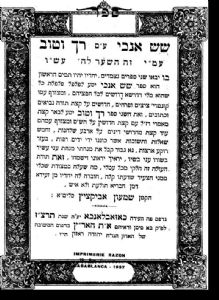A Short Tribute
Hacham Shimon Abecassis was born to Mas'ouda and Hacham Shlomo in 1859, in Mogador, Morocco.
He initially studied and taught Torah in Mogador. In 1931 he moved to Casablanca, where he studied and taught at the Keter Torah yeshiva, under the auspices of Mr. Yitzhak Maliakh, who saw to all his needs. When he returned to Mogador, he officiated as a dayan at Hacham Abraham Ben Soussan's Beit Din.
Hacham Shimon Abecassis married Freiha, and the couple had both sons and daughters.
Hacham Shimon Abecassis passed away on 17 Nissan, 5719 (1959). He is the author of Peleg Mayim – sermons and Ach Tov LeIsrael – original commentary on the Talmud and Responsa, both published in London in 1906, and of Sass Anochi – sermons and original commentary on the Bible and Rach VeTov – original commentary on the Talmud, published in Casablanca in 1937.
A few quotes from the Rabbi on 'Tzedakah and Healing' in which he teaches that a person who deals in Torah but not in charity is like a person without God
Our Sages, of blessed memory, in their commentary on Chronicles, said: "Israel has gone many days without the true God" – What does "without a true God" mean? This teaches us that whoever deals exclusively in Torah is like a person without God. End quote. The author of "Eshel Avraham" wrote that our Sages, of blessed memory, meant that a person who deals exclusively in Torah, but not in charity, is like a person without God. The reason they give is that a person who deals in Torah and believes in God, yet nevertheless does no charity is considered a soul whose image does not entirely follow the outline of His actions, as they, of blessed memory said, concerning the verse "You shall walk after the Lord your God": Follow His attributes and actions, just as He is compassionate, be compassionate. But the image and actions of person who deals in Torah but not in charity remain outside that person's soul. Also, we know that charity is done either physically or with money, which explains what King Solomon, may he rest in peace, said. As a human being you must realize that, "to be in the shelter of wisdom" – by dealing in Torah, as you do, also requires that you be "in the shelter of money" – to be compassionate and generous, to be charitable with your money. In this way, it will be seen that the image of your soul completely follows the outline of His actions, blessed be He, and that you truly have a God, and that one without the other is not possible.
Sass Anochi, p. 166, Yehuda Razzon Press, Casablanca, 1937
